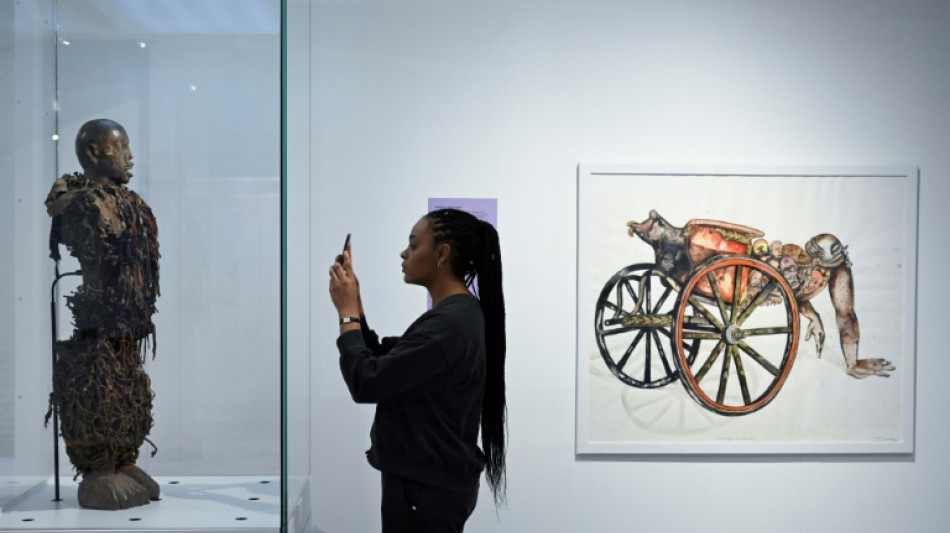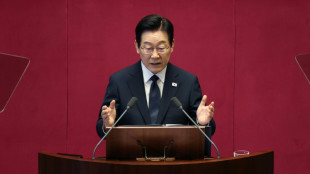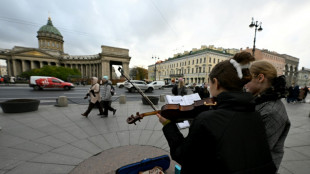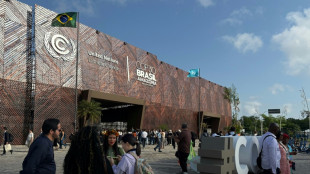
-
 North Korea says Seoul-US sub deal will trigger 'nuclear domino' effect
North Korea says Seoul-US sub deal will trigger 'nuclear domino' effect
-
Education for girls hit hard by India's drying wells

-
 Haitian gangs getting rich off murky market for baby eels
Haitian gangs getting rich off murky market for baby eels
-
Trump says will talk to Venezuela's Maduro, 'OK' with US strikes on Mexico

-
 Oscar Piastri wins Australia's top sports honour
Oscar Piastri wins Australia's top sports honour
-
'Severely restricted': Russia's Saint Petersburg faces cultural crackdown

-
 Polish PM denounces 'sabotage' of railway supply line to Ukraine
Polish PM denounces 'sabotage' of railway supply line to Ukraine
-
UK toughens asylum system with radical overhaul

-
 Carney's Liberals pass budget, avoiding snap Canada election
Carney's Liberals pass budget, avoiding snap Canada election
-
LeBron back in training, edges closer to Lakers return

-
 Climate talks run into night as COP30 hosts seek breakthrough
Climate talks run into night as COP30 hosts seek breakthrough
-
Germany and Netherlands lock up World Cup spots in style

-
 Germany's Woltemade hopes for 2026 World Cup spot after scoring again
Germany's Woltemade hopes for 2026 World Cup spot after scoring again
-
Germany 'send message' with Slovakia rout to reach 2026 World Cup

-
 Trump unveils fast-track visas for World Cup ticket holders
Trump unveils fast-track visas for World Cup ticket holders
-
Netherlands qualify for World Cup, Poland in play-offs

-
 Germany crush Slovakia to qualify for 2026 World Cup
Germany crush Slovakia to qualify for 2026 World Cup
-
Stocks gloomy on earnings and tech jitters, US rate worries

-
 'In it to win it': Australia doubles down on climate hosting bid
'In it to win it': Australia doubles down on climate hosting bid
-
Former NFL star Brown could face 30 yrs jail for shooting case: prosecutor

-
 Fate of Canada government hinges on tight budget vote
Fate of Canada government hinges on tight budget vote
-
New research measures how much plastic is lethal for marine life

-
 Mbappe, PSG face off in multi-million lawsuit
Mbappe, PSG face off in multi-million lawsuit
-
EU defends carbon tax as ministers take over COP30 negotiations

-
 McCartney to release silent AI protest song
McCartney to release silent AI protest song
-
Stocks tepid on uncertainty over earnings, tech rally, US rates

-
 Louvre shuts gallery over ceiling safety fears
Louvre shuts gallery over ceiling safety fears
-
'Stranded, stressed' giraffes in Kenya relocated as habitats encroached

-
 US Supreme Court to hear migrant asylum claim case
US Supreme Court to hear migrant asylum claim case
-
Western aid cuts could cause 22.6 million deaths, researchers say

-
 Clarke hails Scotland 'legends' ahead of crunch World Cup qualifier
Clarke hails Scotland 'legends' ahead of crunch World Cup qualifier
-
S.Africa says 'suspicious' flights from Israel show 'agenda to cleanse Palestinians'

-
 South Korea pledges to phase out coal plants at COP30
South Korea pledges to phase out coal plants at COP30
-
Ex-PSG footballer Hamraoui claims 3.5m euros damages against club

-
 Mbappe, PSG in counterclaims worth hundreds of millions
Mbappe, PSG in counterclaims worth hundreds of millions
-
Two newly discovered Bach organ works unveiled in Germany

-
 Stocks lower on uncertainty over earnings, tech rally, US rates
Stocks lower on uncertainty over earnings, tech rally, US rates
-
Barca to make long-awaited Camp Nou return on November 22

-
 COP30 talks enter homestretch with UN warning against 'stonewalling'
COP30 talks enter homestretch with UN warning against 'stonewalling'
-
France makes 'historic' accord to sell Ukraine 100 warplanes

-
 Delhi car bombing accused appears in Indian court, another suspect held
Delhi car bombing accused appears in Indian court, another suspect held
-
Emirates orders 65 more Boeing 777X planes despite delays

-
 Ex-champion Joshua to fight YouTube star Jake Paul
Ex-champion Joshua to fight YouTube star Jake Paul
-
Bangladesh court sentences ex-PM to be hanged for crimes against humanity

-
 Trade tensions force EU to cut 2026 eurozone growth forecast
Trade tensions force EU to cut 2026 eurozone growth forecast
-
'Killed without knowing why': Sudanese exiles relive Darfur's past

-
 Stocks lower on uncertainty over tech rally, US rates
Stocks lower on uncertainty over tech rally, US rates
-
Death toll from Indonesia landslides rises to 18

-
 Macron, Zelensky sign accord for Ukraine to buy French fighter jets
Macron, Zelensky sign accord for Ukraine to buy French fighter jets
-
India Delhi car bomb accused appears in court


Belgium's Africa museum pores over colonial-era collection
Belgium's main museum dedicated to Africa has started delving into the origins of its enormous collection, as a first step towards possible restitution of items that were obtained in violent ways during colonial times.
"We want to get a better idea of the origin of the pieces and see if we can establish which were obtained through theft, violence or manipulation," Bart Ouvry, director of the Royal Museum for Central Africa on Brussels' outskirts, told AFP.
An inventory of 80,000 objects -- sculptures, masks, utensils, musical instruments -- from the Democratic Republic of Congo (DRC) was already handed over to Kinshasa authorities two years ago.
Shortly after, in 2022, Belgium adopted a law setting out how it would hand back works that were despoiled between 1885 and 1960, when Belgium ruled over the DRC, known then as Congo, first as King Leopold II's private property then as a Belgian colony.
So far, Kinshasa has not made a formal return request, said Thomas Dermine, the Belgian minister in charge of the matter.
He said a joint committee of Belgian and DRC experts would be set up to determine which objects were legitimately obtained and which were not.
To mark the process, a new exhibition, "ReThinking Collections", opened at the museum on Thursday with a statue that once belonged to a Congolese chief, Ne Kuko of Boma, presented as "A Symbol of Stolen Art".
"The Congolese diasporas view this statue as an emblem of the need for restitution," noted Agnes Lacaille, one of the exhibition's curators.
The Nkisi Nkonde Statue was taken by a Belgian officer and explorer, Alexandre Delcommune, during an 1878 expedition in western Congo as punishment for the region hiking taxes on Belgian trade routes.
A historian, Didier Gondola, said that colonial soldiers, administrative officials and missionaries "collected" such artefacts, often using "violence" or "coercion".
Though Belgium is plunging into the issue now, restitution requests were sent starting in the late 1960s by Mobutu Sese Seko, dictator of the country that at that time was known as Zaire.
A decade later, the museum handed over 114 pieces, but not its most prized ones.
"In Mobutu's time, for example, the Europeans said 'We are doing you a favour, because we are conserving your objects. If we gave them to you, they would end up on the international art market, would be sold on, because the government is corrupt, or they'd be ruined because you don't have the means to conserve them'," Gondola said.
- 'National heritage' -
But times have changed, he stressed.
"In Kinshasa, there is a very beautiful museum, just as modern as this one, and there is enough space that these objects can be brought back into the national heritage," he said.
As a halfway measure, Belgium's King Philippe delivered a giant ritual "kakuungu" mask to the DRC's national museum as an "unlimited" loan. The monarch expressed "deep regret" for Belgium's colonial period.
Belgium's plunder did more than erode the DRC's physical heritage, explained another exhibition curator, Sarah Van Beurden, as she stood before a "manza" xylophone taken in 1911-1912.
"When you take an object like this xylophone, you take away the ability for a community to maintain its cultural customs," she said.
"You can return the object. But you can't return what the community has lost."
In a gesture to repair that loss, a project has been mounted with DRC youth from the community where the instrument was taken to recreate -- "in a different way" -- music that it produces, she said.
S.Abdullah--SF-PST




